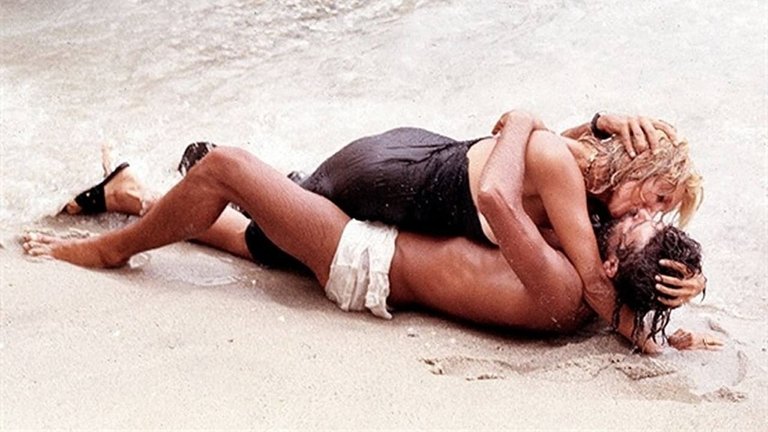Film Review: Swept Away (Travolti da un insolito destino nell'azzurro mare d'agosto, 1974)

A single film can mean completely different things to different people, and sometimes those differences include even the most basic question of whether the film is a comedy or a drama. One of the more telling examples, also known as one of the most divisive films of its era, is the 1974 Italian film Swept Away... by an Unusual Destiny in the Blue Sea of August by Lina Wertmüller, better known under its shortened title Swept Away.
The plot is relatively simple: it follows the story of Raffaella Pavone Lanzetti (played by Mariangela Melato), an arrogant and wealthy woman, and Gennarino Carunchio (played by Giancarlo Giannini), a poor and resentful sailor. It all begins on yacht where Raffaela enjoying trip with her husband and couple of friends and uses any opportunity to humiliate and insult Gennarino, including mocking his poor Southern background, unrefined manners and Communist beliefs. One day, after sleeping late in afternoon, she orders Gennarino to take her on dinghy to take a swim. That proves to be mistake, because engine fails, they get lost and ultimately end on on a deserted island after a yacht trip. Gennarino as working class man proves to be more resourceful and adept in finding food and shelter, and Raffaela is forced to earn some of it by acting as his servant and suffering all kinds of verbal, physical and, ultimately, sexual abuse. Much to her surprise, Raffaela not only comes to terms with this situation but begins to genuinely feel love to her “master”. Their life begins to look idillyc, but macho pride makes Gennarino test true nature of their relationship by returning to civilisation.
Lina Wertmüller, the director of Swept Away, was one of the rare female directors in the history of Italian cinema, and she was renowned for her series of 1970s comedies that featured a mix of grotesquely black humor, frank exploration of sexual issues, and explicit political commentary. Along with The Seduction of Mimi and Seven Beauties, Swept Away is considered her best work.
The film's limited settings – a yacht, a dinghy, and a deserted island – meant that Wertmüller didn't need to focus too much on the visuals. However, cinematographer Ennio Guarnieri's use of grey tones at the end of the film, when the protagonists return to civilization, effectively signals the protagonists' mood. The music in the film is almost unnoticeable, allowing the performances of the two lead actors to take centre stage.
The film's success is largely due to the outstanding performances of Giancarlo Giannini and Mariangela Melato, who had previously worked with Wertmüller. Both actors demonstrate a remarkable talent for comedy, but they also manage to gain the audience's sympathy for characters who are at times presented as utterly dislikeable. Raffaella, the arrogant rich woman, gradually gains the audience's sympathy as the tables are turned, and she is forced to submit to her new "master." Gennarino, on the other hand, starts as a victim, then becomes an abuser, and in the end, falls victim to his own arrogance. Unsurprisingly, both Giannini and Melato went on to have successful international careers, with Giannini becoming one of the most recognizable Italian actors in the world.
The film's controversial nature has led to a range of reactions from critics. Some have attacked it as a male rape fantasy, while others have praised it for its clever use of a simple adventure genre scenario to provide a humorous commentary on issues of gender, class, economics, and political power. However, some of the film's humour may appear dated to modern audiences, particularly due to references to early 1970s Italian politics and the complex relations between the country's Communists and Catholics. One of the film's biggest drawbacks is its relatively slow pace, which makes it almost two hours long and may test the patience of some modern viewers. Nevertheless, Swept Away remains a compelling and thought-provoking film that continues to be a subject of debate and analysis.
In 2002, the film was remade in Hollywood, directed by Guy Ritchie and starring Ritchie's wife Madonna and Giannini's son Adriano Giannini. However, this remake turned into an embarrassing flop, whose infamy sadly overshadowed many of the qualities of the 1974 original.
RATING: 6/10 (++)
Blog in Croatian https://draxblog.com
Blog in English https://draxreview.wordpress.com/
InLeo blog https://inleo.io/@drax.leo
Hiveonboard: https://hiveonboard.com?ref=drax
Rising Star game: https://www.risingstargame.com?referrer=drax
1Inch: https://1inch.exchange/#/r/0x83823d8CCB74F828148258BB4457642124b1328e
BTC donations: 1EWxiMiP6iiG9rger3NuUSd6HByaxQWafG
ETH donations: 0xB305F144323b99e6f8b1d66f5D7DE78B498C32A7
BCH donations: qpvxw0jax79lhmvlgcldkzpqanf03r9cjv8y6gtmk9
Posted Using InLeo Alpha